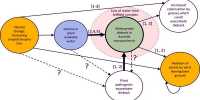According to research, reading on a screen is a less effective way to absorb and remember information than traditional reading, but why? And, with so many of us experiencing shorter attention spans, how can we retrain ourselves to focus on books?
In a world where screens are ubiquitous, both at work and in leisure time, it was unavoidable that the way we read would change.
Digital content varies in length from quick social media postings and video subtitles to longer-form material such as e-books, reports, and academic papers, which demand more sustained focus and attention, as well as a greater degree of comprehension.
While the fundamental act of looking at and analyzing written words remains the same, reading on a screen varies from “static” reading of paper-based content.

Researchers from Macquarie University, Dr. Sixin Liao, Dr. Lili Yu, Dr. Jan-Louis Kruger, and Professor Erik Reichle, recently published a review of dynamic reading in the digital age in Trends in Cognitive Science.
According to Professor Erik Reichle of the School of Psychological Sciences, reading is a relatively new addition to our communication arsenal.
“We did not evolve to read, and the interplay of cognitive and visual systems that are needed for us to do so is incredibly complex,” he said.
“It necessitates fast shifts of attention and higher-level linguistic representation in a sequence of distinct mental processes, all of which occur dynamically and last 60-200 milliseconds.
“Our language evolved as speech, so speaking and listening are natural, but reading appeared only about 5,500 years ago.”
“We are not hard-wired to read, and it remains something we have to learn, and can only master by practicing for 10 to 15 years.”
Screen inferiority effect: If reading is a recent innovation, reading on screens is entirely new, and it has presented new problems to our brains.
A lot of study studies imply that when we read text on a screen, we understand less than when we read identical information on paper, and this is true across languages and writing systems.
This is known as the screen inferiority effect, and one of its drawbacks is that we are more likely to remember the essence of what we’ve read rather than the specifics.
According to Dr. Lili Yu of the School of Psychological Sciences, a variety of factors may be at play, including the substance of what we are reading.
“When people become immersed in a narrative, like a novel, then comprehension is less likely to be affected by reading on a screen,” she said.
“However, comprehension suffers when we use a screen to read information-dense literature, such as a textbook for study.
“The amount of time you have available also appears to be a factor, since when readers are put under pressure in trials to read anything fast, their comprehension suffers for tests on screen versus paper.
“The effect is more pronounced for less skilled readers, and one study also suggested that reading on a screen can increase readers’ susceptibility to misinformation, as they don’t notice discrepancies in the content so easily.”
The exact reason for this decline in comprehension is unknown and will require additional research.
According to Dr. Yu, physical factors such as eye strain, brightness, comfort, and fatigue may contribute, as well as habit and association.
With the introduction of smartphones, we began to connect screens with shorter, less serious information that encourages skimming. Reading anything lengthier and more complex might make it difficult to focus, especially on small screens.
Distractions on screens include notifications, animated adverts, pop-ups, auto-playing videos, and links to other articles, all fighting for our attention.
The lone exception to the screen inferiority rule could be e-readers, which are designed to precisely replicate the experience of reading a book.
According to Dr. Yu, screen inferiority could have an impact on learning, both online and in schools where screens are employed.
“We know people who are less skilled readers are most affected, which means the greatest impact is likely to be on the people who already need more help to succeed,” she goes on to say.
“Something we don’t yet understand is what effect it will have on children who are learning to read primarily on screens, and we are not likely to find out for another 10 to 15 years.”
Getting back to paper: As screen reading erodes our understanding, some of us have seen a decline in our capacity to focus on printed material such as books.
According to Professor Reichle, frequent multitasking has contributed to a reduction in the amount of time we can concentrate.
“When we are watching TV or talking to someone, we are often using our phones to scroll social media or play a game at the same time,” he said.
“We’re not giving each activity our whole attention, but the stuff we’re seeing there is short, entertaining, and we’ve discovered that it can provide us with frequent dopamine hits.
“Books are static, nothing is moving or flashing, so it has become harder for them to keep our attention.”
And if we are looking for a quick remedy, the news is not good.
Professor Reichle believes that the only way to get back into the habit of focusing on books is to read them more.
He suggests selecting a book that you know will be of interest, sitting in a comfortable location with excellent lighting, and limiting other distractions such as phones and televisions.
“Focus is a skill that you have to rebuild gradually, so don’t expect to get it back immediately,” he said.















